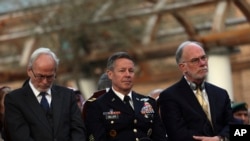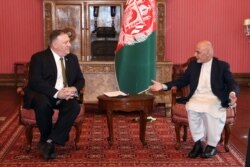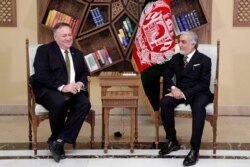The U.S. commander of a NATO-led military coalition in Afghanistan warned Tuesday that continued hostilities would make it “impossible” to counter the spread of COVID-19 in the country, where four foreign troops are among dozens of people who tested positive for the disease.
In a video conference with senior Afghan security leaders, Gen. Scott Miller of the Resolute Support Mission stressed the virus has affected the entire world and threatens both foreign and Afghan forces battling the Taliban.
“The focus on this particular virus has to be on preventing the spread, which is difficult under even normal circumstances, but almost impossible if we have violence,” Miller said.
The general emphasized that for a focused counter-coronavirus campaign, all parties to the Afghan conflict need to reduce violence.
Afghan authorities Tuesday confirmed 32 new coronavirus cases, bringing the national tally of infections to at least 74, including one death.
The public health ministry said most of the cases happened in western Herat province on the border with Iran, and those affected are returnees from the neighboring country, where the virus has already killed around 2,000 people and infected 25,000.
NATO’s mission announced Tuesday that four soldiers arriving in the country had tested positive for the virus but did not reveal their nationalities.
Miller noted that all warring sides have committed themselves to a peace process, warning the Taliban against further escalating the violence.
“We all know that it’s too high. We have told the Taliban it’s too high, as well, and we tell them that on a daily basis,” Miller said.
“For our part, the Taliban explicitly know and agree that we have the right to defend not only ourselves, but our Afghan security force partners. And so, if they attack, there will be a response.”
Afghan political rift persists
The U.S. commander made the remarks as Afghan President Ashraf Ghani and his political rival, Abdullah Abdullah, showed no sign Tuesday of ending their lingering bitter dispute that stemmed from the controversy-marred presidential election on Sept. 28.
Both Afghan rival leaders held competing presidential inaugurations earlier this month, paralyzing governance in the war-shattered nation and threatening a nascent peace-building pact Washington signed with the Taliban Feb. 29 following months of marathon negotiations.
On Monday, U.S. Secretary of State Mike Pompeo visited Kabul to resolve the lingering political standoff to move the peace process forward, but he failed to broker a deal between Ghani and Abdullah.
Pompeo, in a post-visit, hard-hitting statement, criticized both leaders for their failure to come to an agreement. Pompeo said the United States would immediately reduce $1 billion in assistance for Afghanistan and threatened to cut another $1 billion in 2021.
The U.S.-Taliban deal sealed in Qatar requires all international troops to withdraw from the country within 14 months. It was also supposed to open peace negotiations earlier this month between the insurgent group and an inclusive Afghan delegation to agree on a sustainable cease-fire and power-sharing.
The election-related political feud has prevented the formation of a united Afghan team engaged in talks with the Taliban.
Ghani and Abdullah, reacting separately to Pompeo’s announcement, blamed each other on Tuesday for the political crisis.
Ghani, in a televised address, downplayed the U.S. aid cut, saying it “will have no direct impact on our key sectors,” and insisted his government would try to satisfy Washington "through talks and negotiations.”
He went on to accuse Abdullah of making “unconstitutional demands to settle the rift in a joint meeting with Pompeo on Monday.
Abdullah said in a statement that while Pompeo's trip had created an opportunity to resolve the crisis, "unfortunately it was not utilized properly.”
After concluding his Kabul trip, Pompeo traveled to Qatar to meet with Taliban leader Mullah Baradar and his aides to review the implementation of the agreement between the two adversaries,
“The U.S. Secretary of State Mike Pompeo gave assurances that the U.S. forces withdrawal will continue in accordance with the declared timetable,” a Taliban statement said.






